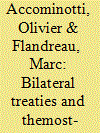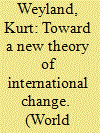|
|
|
Sort Order |
|
|
|
Items / Page
|
|
|
|
|
|
|
| Srl | Item |
| 1 |
ID:
082612


|
|
|
|
|
| Publication |
2008.
|
| Summary/Abstract |
Textbook accounts of the Anglo-French trade agreement of 1860 argue that it heralded the beginning of a liberal trading order. This alleged success holds much interest from a modern policy point of view, for it rested on bilateral negotiations and most-favored-nation clauses. With the help of new data on international trade (the RICardo database), the authors provide empirical evidence and find that the treaty and subsequent network of mfn trade agreements coincided with the end of a period of unilateral liberalization across the world. They also find that it did not contribute to expanding trade at all. This is contrary to a deeply rooted belief among economists, economic historians, and political scientists. The authors draw a number of policy lessons that run counter to the conventional wisdom and raise skepticism toward the ability of bilateralism and mfn arrangements to promote trade liberalization.
|
|
|
|
|
|
|
|
|
|
|
|
|
|
|
|
| 2 |
ID:
082614


|
|
|
|
|
| Publication |
2008.
|
| Summary/Abstract |
Although research in the advanced industrial nations has identified a supportive link between an expanded public sector role and economic openness, studies of the developing world have been much less sanguine about the possibilities of broader state intervention in the context of economic liberalization. The authors investigate the possibility that governments in Latin America may "embed" economic openness in a broader public sector effort. They find that while several countries have moved toward an orthodox neoliberal model with minimal state interventions, other Latin American governments have maintained a broader public sector presence on the supply side of the economy while pursuing deep liberalization. They call the latter strategy "embedded neoliberalism," to distinguish it from the more egalitarian ambitions of postwar embedded liberalism. Cross-sectional time-series analysis reveals that embedded neoliberal strategies in Latin America have grown out of a legacy of advanced import-substitution industrialization and have been promoted by nonleft governments, except in cases where labor is very strong. The orthodox neoliberal model, by contrast, has emerged where postwar industrial development was attenuated and where labor unions were weakened considerably by the debt crisis.
|
|
|
|
|
|
|
|
|
|
|
|
|
|
|
|
| 3 |
ID:
082615


|
|
|
|
|
| Publication |
2008.
|
| Summary/Abstract |
Going beyond historical and rational choice institutionalism, this article elaborates the core of a new theory that can account for the discontinuous, disproportionate, and frequently wavelike nature of institutional change. Cognitive-psychological findings on shifts in actors' propensity for assuming risk help explain why periods of institutional stasis can be followed by dramatic breakthroughs as actors eventually respond to a growing problem load with efforts at bold transformation. And insights on boundedly rational learning explain why solutions to these problems often occur as emulation of other countries' innovations and experiences. The new approach, which elucidates both the demand and the supply side of institutional change, is illustrated through an analysis of the transformation of developmental states, welfare states, and political regimes.
|
|
|
|
|
|
|
|
|
|
|
|
|
|
|
|
| 4 |
ID:
082613


|
|
|
|
|
| Publication |
2008.
|
| Summary/Abstract |
Higher education policy has been subject to considerable reform in oecd states over the past two decades. Some states have introduced tuition fees, others have massively increased public funding for higher education, and still others remain in stasis, retaining the elitist model with which they began the postwar era. This article develops the argument that higher education policy in the oecd is driven by a set of partisan choices within a trilemma between the level of enrollment, the degree of subsidization, and the overall public cost of higher education. The author develops a formal model of the micromechanisms underlying movements within this trilemma, noting the importance of partisan politics, existing enrollment, tax structure, and access. These propositions are tested statistically on a sample of twenty-two oecd countries and through case histories of higher education reform in England, Sweden, and Germany
|
|
|
|
|
|
|
|
|
|
|
|
|
|
|
|
|
|
|
|
|